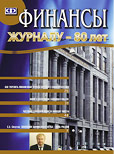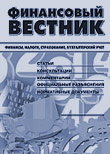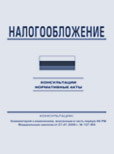Содержание
АКТУАЛЬНО
Д.В. Егоров, руководитель Федеральной налоговой службы, действительный государственный советник Российской Федерации 1 класса
E-mail: finance-journal@mail.ru
В статье от первого лица ведомства рассказывается о том, как происходило развитие Налоговой службы за последние 35 лет, о ключевых подходах ФНС России к работе с налогоплательщиками, о совершенствовании своих бизнес-процессов и др. При этом конечной целью деятельности ФНС России видится не только повышение удобства уплаты и учета налогов. Сегодня ведомство делает упор и на повышение налоговой грамотности в стране.
Ключевые слова: 35-летие ФНС России, системы и сервисы ФНС России, цифровая платформа ФНС России, сервисность, платформенность, клиентоцентричность.
РЕГИОНАЛЬНЫЕ ФИНАНСЫ
E-mail: finance-journal@mail.ru
В беседе с министром финансов Свердловской области затронуты вопросы, касающиеся влияния новаций федерального законодательства на бюджетную составляющую Среднего Урала.
Ключевые слова: налоговое законодательство, собственные доходы бюджета, межбюджетные отношения, областной бюджет, местные бюджеты, местное самоуправление.
Н.Е. Барбашова, старший научный сотрудник Института прикладных экономических исследований РАНХиГС, кандидат экономических наук
E-mail: barbashova-ne@ranepa.ru
Оценка качества управления финансами – важная часть бюджетного процесса в Российской Федерации. Мониторинг качества управления бюджетными финансами проводится как на федеральном, так и на региональном уровне. Методика оценки, применяемая Российской Федерацией в отношении регионов, регулярно рассматривается в отечественных научных исследованиях. В то же время наблюдается дефицит работ, посвященных оценке качества финансового менеджмента, осуществляемой регионами в отношении муниципальных образований. Целью данной работы является сравнительный анализ систем оценки качества управления муниципальными финансами в регионах России. На основе проведенного анализа формулируются рекомендации по совершенствованию системы управления муниципальными финансами и распространению лучшей региональной практики в данной сфере.
Ключевые слова: качество управления муниципальными финансами, финансовый менеджмент, мониторинг качества, местный бюджет.
КАЗНАЧЕЙСТВО: СТАНОВЛЕНИЕ И РАЗВИТИЕ
Л.Р. Ковтун, доцент кафедры финансов и финансовых институтов Байкальского государственного университета (г. Иркутск), кандидат экономических наук, доцент
E-mail: Lira-tim@yandex.ru
И.Н. Щербакова, доцент кафедры финансов и финансовых институтов Байкальского государственного университета (г. Иркутск), кандидат экономических наук, доцент
E-mail: schirn@mail.ru
Т.В. Файберг, доцент кафедры финансов и финансовых институтов Байкальского государственного университета (г. Иркутск), кандидат экономических наук, доцент
E-mail: faibergtv@mail.ru
Развитие государственного финансового контроля в сфере закупок осуществляется по разным направлениям, в том числе и по казначейскому контролю. В этих целях возникает необходимость рассмотреть механизм его реализации во взаимосвязи со стадиями бюджетного процесса и этапами управления государственными закупками. В статье систематизированы органы государственного контроля в сфере закупок на примере Иркутской области, выделены полномочия органов Федерального казначейства и их реализация в рамках текущего и последующего контроля. Проведен анализ результатов контрольной деятельности УФК по Иркутской области в сфере закупок в 2022–2024 гг.
Ключевые слова: финансы, бюджет, государственные закупки, финансовый контроль, казначейский контроль, контрактная система.
НАЛОГИ: ТЕОРИЯ И ПРАКТИКА
М.В. Прусова, главный аудитор ООО «Правовест Аудит», советник налоговой службы Российской Федерации 2 класса
E-mail: mvprusova@yandex.ru
М.М. Юмаев, профессор кафедры налогов и налогового администрирования Факультета налогов, аудита и бизнес-анализа Финансового университета при Правительстве Российской Федерации, доктор экономических наук
E-mail: mmyumaev@yandex.ru
В статье представлены результаты исследования интеграции цифрового рубля в налоговую систему Российской Федерации. Цель работы – определить, является ли внедрение цифрового рубля прогрессивным шагом, способным существенно повысить эффективность фискальных процессов, или формальной адаптацией действующих норм законодательства к новым технологическим условиям без принципиальных изменений в налоговом администрировании. Проанализированы изменения в законодательстве, рассмотрены позиции ведущих экспертов, проведен сравнительный анализ зарубежных практик внедрения цифровой валюты. Предложены направления развития налогового администрирования с учётом внедрения цифровой национальной валюты.
Ключевые слова: цифровая валюта, цифровой рубль, налоговое администрирование, налоговая система, цифровизация, налоговые льготы.
С.В. Ануреев, профессор кафедры общественных финансов Финансового университета при Правительстве Российской Федерации, доктор экономических наук
E-mail: anureev@bk.ru
По налогам организаций публикуются фрагментарные и разнообразные данные в бухгалтерской отчетности организаций, страничке сайта ФНС России «Прозрачный бизнес», интегрированной нефинансовой отчетности. Одновременно страничка сайта ФНС России «Данные по формам статистической налоговой отчетности» содержит подробности по каждому налогу в отраслевом и региональном разрезах, но не по конкретным организациям. В статье анализируется специфика каждого из публичных источников налоговой информации, выдвигается гипотеза о целесообразности унификации и разумной детализации такой информации, предлагается форма отчетности с базой и суммой по основным налогам на одной странице. Такая отчетность позволит региональным администрациям, депутатам, ученым, средствам массовой информации четче выявлять различия по организациям в фактических налогах, содействовать тем самым налоговым органам в большей справедливости и полноте уплаты налогов и использовании налоговых льгот.
Ключевые слова: справедливое налогообложение, крупные налогоплательщики, теневая занятость, налоговые льготы, общественный контроль.
СТРАХОВАНИЕ
Л.И. Цветкова, профессор кафедры управления рисками и страхования Московского государственного института международных отношений (университета) Министерства иностранных дел Российской Федерации, доктор экономических наук, профессор
E-mail: l.tsvetkova@inno.mgimo.ru
На основе исследования современных трендов развития мирового страхового рынка, автор отмечает, что страхование переживает парадигмальный сдвиг: из сферы, ориентированной на услуги и риски, оно превращается в отрасль, где в центре внимания находятся потребности и ценности клиента. Учитывая, что экосистему следует рассматривать как модель коммуникаций в клиентоцентричной экономике, показано, что включение страховой компании в состав участников экосистемы – это самая перспективная модель развития системы управления рисками всех ее членов и модель развития страхового рынка. В качестве основных условий, определяющих развитие страхового рынка в настоящем периоде, автор выделяет запрос потребителя на персонализацию предлагаемых продуктов, появление и развитие систем искусственного интеллекта (AI), рост конкуренции за капитал. Основная гипотеза – развитие страхования определяется вхождением страховых компаний в бизнес-экосистемы. Сделан вывод о том, что страховая компания является эффективным участником экосистемы не просто как «еще один сервис», она должна стать кровеносной системой, которая связывает различные продукты, усиливая их ценность и создавая эффект синергии. При этом допущение участия в экосистеме независимых компаний не отменяет кэптивность страховщика, а трансформирует ее, делая страховую компанию более открытой, клиентоориентированной и прибыльной, но все так же стратегически подконтрольной ядру экосистемы.
Ключевые слова: страхование, экосистема, человекоцентричность, клиентоцентричная экономика, цифровые технологии, риски, кэптивность.
ФИНАНСОВЫЕ РЫНКИ
Т.В. Жукова, старший научный сотрудник сектора теории финансовых рынков Национального исследовательского института мировой экономики и международных отношений имени Е.М. Примакова Российской академии наук, кандидат экономических наук
E-mail: ttanya2001@gmail.com
В статье исследуется феномен фрагментарности глобального финансового рынка (ГФР), обусловленной центробежными тенденциями, санкционными и тарифными войнами, а также противоречием между экономическим весом и финансовым влиянием развивающихся стран.
На основе анализа динамики финансовых центров и трансграничных потоков капитала за 2009–2023 (2024) гг. выявлены ключевые проявления фрагментарности: уменьшение числа глобальных финансовых центров при росте международных и локальных, переток капитала в сторону быстрорастущих экономик и его иммобилизация вследствие их меньшей интеграции в ГФР, возвышение блока БРИКС. Показано, что геофинансовая фрагментарность трансформирует функции ГФР, создавая не только риски (снижение ликвидности, рост издержек), но и возможности (снижение спекуляций, минимизация санкционных рисков, ориентация на реальный сектор).
Эмпирическую базу составляют данные Глобального индекса финансовых центров, обследований МВФ (CDIS, CPIS), статистики ЮНКТАД, а также авторская классификация стран на 10 геоэкономических групп по критерию общности стратегического позиционирования.
Для России и ЕАЭС геофинансовая фрагментарность создает стратегическую возможность трансформации из периферии ГФР в самостоятельный полюс притяжения капитала. Несмотря на сдерживающие факторы (низкая ликвидность рынков, различия в регулировании), конкурентные преимущества блока быстрорастущих экономик с развитыми производственно-хозяйственными связями создают потенциал для превращения фрагментарности в катализатор формирования финансовой архитектуры евразийского пространства.
Ключевые слова: глобальный финансовый рынок, геоэкономическая фрагментарность, финансовый суверенитет, трансграничные потоки капитала, финансовые центры, БРИКС, ЕАЭС. АСЕАН, англосаксонский блок, США, Китай, Россия, прямые иностранные инвестиции, портфельные иностранные инвестиции, функции глобального финансового рынка.
ИЗ ИСТОРИИ ФИНАНСОВ
А.В. Пачкалов, доцент Литературного института имени А.М. Горького, кандидат исторических наук
E-mail: zolornum@mail.ru
Наркомом финансов СССР А. Г. Зверевым были оставлены воспоминания, представляющие собой ценный исторический источник (Записки министра. М., 1973). В данной публикации представлены неопубликованные фрагменты из воспоминаний Арсения Григорьевича, любезно предоставленные Е.С. Поповой, внучкой выдающегося советского финансиста.
Ключевые слова: министр финансов СССР А.Г. Зверев, неопубликованные фрагменты воспоминаний, отставка с должности министра финансов.
ИНФОРМАЦИЯ
E-mail: finance-journal@mail.ru
Представлена информация о проходившем 20–22 октября в Москве ХXI Всероссийском налоговом форуме «Налоговая политика: взгляд бизнеса и власти», организованном Торгово-промышленной палатой РФ (ТПП РФ), в котором приняли участие более 1500 человек. На шести секциях представители бизнеса и органов государственной власти и управления, аудиторы, консультанты обсуждали самые острые и важные для бизнеса проблемы в сфере налогообложения, предлагали пути их решения. Завершился форум пленарным заседанием, на котором с основным докладом выступил президент ТПП РФ
С.Н. Катырин, затронувший проблемы, связанные с изменениями параметров налоговой системы, запланированными с 01.01.2026, и представивший предложения по совершенствованию налогового законодательства. Глава Федеральной налоговой службы
Д.В. Егоров в своем выступлении отметил, что Служба готова к изменениям налогового законодательства, которые сейчас рассматриваются, заверил, что подходы к применению ставки НДС в переходный период будут аналогичны подходам 2019 г., рассказал о планах проведения масштабной информационной кампании чтобы разъяснить все нюансы налогоплательщикам. Также Д.В. Егоров подвел предварительные итоги амнистии по дроблению бизнеса и уделил особое внимание снижению административного давления. Завершая заседание С.Н. Катырин отметил важную роль Форума как успешной площадки для выработки конструктивных предложений, которые затем реализуются, и поблагодарил ФНС за активную совместную работу как в рамках мероприятия, так и за пределами площадки.
Ключевые слова: налоговая политика, увеличение ставки налога, снижение порога по уплате налога, переходный период, налоговая амнистия, информационная кампания, административное давление.
Content
TOPICAL
D.V. Egorov, Head of the Federal Tax Service, Acting State Advisor to the Russian Federation, Class 1
E-mail: finance-journal@mail.ru
The article from the first person of the department tells about how the development of the Tax Service over the past 35 years, about the key approaches of the Federal Tax Service of Russia to working with taxpayers, about improving their business processes, etc. At the same time, the ultimate goal of the FTS of Russia is not only to increase the convenience of paying and accounting for taxes. Today, the department also focuses on increasing tax literacy in the country.
Keywords: 35th anniversary of the Federal Tax Service of Russia, systems and services of the Federal Tax Service of Russia, digital platform of the Federal Tax Service of Russia, serviceability, platform, customer centricity.
REGIONAL FINANCE
E-mail: finance-journal@mail.ru
In an interview with the Minister of Finance of the Sverdlovsk Region, questions were raised regarding the impact of innovations in federal legislation on the budget component of the Middle Urals.
Keywords: tax legislation, own budget revenues, interbudgetary relations, regional budget, local budgets, local self-government.
N.E. Barbashova, Senior Researcher, Institute for Applied Economic Research, RANEPA (Moscow), Candidate of Economic Sciences
E-mail: barbashova-ne@ranepa.ru
Assessing the quality of financial management is an important part of the budget process in the Russian Federation. Monitoring the quality of budget financial management is carried out at both the federal and regional levels. The assessment methodology applied by the Federation in relation to regions is regularly considered in domestic scientific research. At the same time, there is a shortage of works devoted to the assessment of the quality of financial management carried out by regions in relation to municipalities. The purpose of this paper is a comparative analysis of the systems for assessing the quality of municipal finance management in the regions of Russia. Based on the analysis, recommendations are formulated for improving the municipal finance management system and disseminating the best regional practices in this area.
Keywords: financial management, quality monitoring, local budget.
TREASURY: FORMATION AND DEVELOPMENT
L.R. Kovtun, Associate Professor, Department of Finance and Financial Institutions, Baikal State University (Irkutsk), Candidate of Economic Sciences, Associate Professor
E-mail: Lira-tim@yandex.ru
I.N. Shcherbakova, Associate Professor, Department of Finance and Financial Institutions, Baikal State University (Irkutsk), Candidate of Economic Sciences, Associate Professor
E-mail: schirn@mail.ru
T.V. Faiberg, Associate Professor, Department of Finance and Financial Institutions, Baikal State University (Irkutsk), Candidate of Economic Sciences, Associate Professor
E-mail: faibergtv@mail.ru
The development of state financial control in the field of procurement is carried out in various areas, including treasury control. For this purpose, it is necessary to consider the mechanism of its implementation in relation to the stages of the budget process and the stages of public procurement management. The article systematizes the bodies of state control in the field of procurement using the example of the Irkutsk Region, highlights the powers of the Federal Treasury bodies and their implementation within the framework of current and subsequent control. The article analyzes the results of the control activities of the Federal Treasury Department for the Irkutsk Region in the field of procurement in 2022–2024.
Keywords: finance, budget, procurement, financial control, treasury control, contract system.
TAXES: THEORY AND PRACTICE
M.V. Prusova, Chief Auditor of LLC Pravovest Audit, Advisor to the Tax Service of the Russian Federation, Class 2
E-mail: mvprusova@yandex.ru
M.M. Yumaev, Professor, Department of Taxes and Tax Administration, Faculty of Taxes, Audit and Business Analysis, Financial University under the Government of the Russian Federation, Doctor of Economics
E-mail: mmyumaev@yandex.ru
The article presents the results of a study on the integration of the digital ruble into the tax system of the Russian Federation. The purpose of the work is to determine whether the introduction of the digital ruble is a progressive step that can significantly increase the efficiency of fiscal processes, or a formal adaptation of current legislation to new technological conditions without fundamental changes in tax administration. Changes in legislation were analyzed, the positions of leading experts were considered, a comparative analysis of foreign practices of introducing digital currency was carried out. Directions for the development of tax administration are proposed, taking into account the introduction of a digital national currency.
Keywords: digital currency, digital ruble, tax administration, tax system, digitalization, tax incentives.
S.V. Anureyev, Professor, Department of Public Finance, Financial University under the Government of the Russian Federation, Doctor of Economics
E-mail: anureev@bk.ru
For taxes of organizations, fragmentary and diverse data are published in the financial statements of organizations, the page of the website of the Federal Tax Service of Russia "Transparent Business," integrated non-financial reporting. At the same time, the page of the website of the Federal Tax Service of Russia "Data on forms of statistical tax reporting" contains details for each tax in the industry and regional sections, but not for specific organizations. The article analyzes the specifics of each of the public sources of tax information, puts forward a hypothesis about the advisability of unifying and reasonably detailing such information, proposes a reporting form with a database and the amount of basic taxes on one page. Such reporting will allow regional administrations, deputies, scientists, and the media to more clearly identify differences by organization in actual taxes, thereby contributing to tax authorities in greater fairness and completeness of tax payments and the use of tax benefits.
Keywords: fair taxation, big taxpayers, shadow employment, tax breaks, public scrutiny.
INSURANCE
L.I. Tsvetkova, Professor, Department of Risk Management and Insurance, Moscow State Institute of International Relations (University), Ministry of Foreign Affairs of the Russian Federation, Doctor of Economics, Professor
E-mail: l.tsvetkova@inno.mgimo.ru
Based on a study of modern trends in the development of the global insurance market, the author notes that insurance is undergoing a paradigm shift: from an area focused on services and risks, it is turning into an industry where the needs and values of the client are in the spotlight. Considering that the ecosystem should be considered as a model of communications in a customer-centric economy, it has been shown that the inclusion of an insurance company in the ecosystem is the most promising model for the development of the risk management system of all its members and the model for the development of the insurance market. As the main conditions determining the development of the insurance market in the present period, the author highlights the consumer's request for personalization of the products offered, the emergence and development of artificial intelligence (AI) systems, and increased competition for capital. The main hypothesis is that the development of insurance is determined by the entry of insurance companies into business ecosystems. It concluded that the insurance company is an effective participant in the ecosystem not just as "another service," it should become a circulatory system that connects various products, strengthening their value and creating a synergy effect. At the same time, the assumption of participation in the ecosystem of independent companies does not cancel the captivity of the insurer, but transforms it, making the insurance company more open, customer-oriented and profitable, but still strategically controlled by the core of the ecosystem.
Keywords: insurance, ecosystem, human-centric, customer-centric economy, digital technologies, risks, captivity.
FINANCIAL MARKETS
T.V. Zhukova, Senior Researcher, Section of Financial Markets Theories, Primakov National Research Institute of World Economy and International Relations of the Russian Academy of Sciences (IMEMO), Moscow, Russia, Candidate of Economic Sciences
E-mail: ttanya2001@gmail.com
The article examines the phenomenon of global financial market (GFM) fragmentation driven by centrifugal trends, sanctions and tariff wars, as well as the contradiction between the economic weight and financial influence of developing countries.
Based on the analysis of financial centers dynamics and cross-border capital flows in 2009–2023 (2024), key manifestations of fragmentation are identified: decrease in global financial centers alongside growth of international and local ones, capital shift toward fast-growing economies with subsequent immobilization due to their lower GFM integration, and the rise of BRICS+ bloc. It is demonstrated that geofinancial fragmentation transforms GFM functions, creating not only risks (liquidity reduction, cost increase) but also opportunities (speculation decrease, sanctions risks minimization, real sector orientation).
The empirical base includes Global Financial Centres Index data, IMF surveys (CDIS, CPIS), UNCTAD statistics, and the author's classification of countries into 10 geoeconomic groups based on common strategic positioning criteria.
For Russia and the EAEU, geofinancial fragmentation creates a strategic opportunity to transform from GFM periphery into an independent capital attraction pole. Despite constraining factors (market low liquidity, regulatory differences), the competitive advantages of fast-growing economies with developed production-economic ties create potential for turning fragmentation into a catalyst for forming a sovereign financial architecture in the Eurasian.
Keywords: alternative finance, alternative financing, crowdfunding, crowdlending, crowdinvesting, innovation, anti-crisis regulation.
FROM THE HISTORY OF FINANCE
A.V. Pachkalov, Associate Professor of the Literary Institute named after A.M. Gorky, Candidate of Historical Sciences
E-mail: zolornum@mail.ru
People's Commissar of Finance of the USSR A. G. Zverev left memories that are a valuable historical source (Notes of the Minister. M., 1973). This publication presents unpublished fragments from the memoirs of Arseny Grigorievich, courtesy of E.S. Popova, granddaughter of an outstanding Soviet financier.
Keywords: Minister of Finance of the USSR A.G. Zverev, unpublished fragments of memories, resignation from the post of Minister of Finance.
INFORMATION
E-mail: finance-journal@mail.ru
Information is presented on the XXI All-Russian Tax Forum "Tax Policy: Business and Government View," held on October 20-22 in Moscow, organized by the Chamber of Commerce and Industry of the Russian Federation (CCI RF), in which more than 1,500 people took part. At six sections, representatives of business and government bodies and management, auditors, consultants discussed the most acute and important problems for business in the field of taxation, offered ways to solve them. The forum ended with a plenary session, at which the President of the Chamber of Commerce and Industry of the Russian Federation
S.N. Katyrin made a keynote speech, touching upon the problems associated with changes in the parameters of the tax system planned since 01.01.2026 and presenting proposals for improving tax legislation. The head of the Federal Tax Service
D.V. Egorov in his speech noted that the Service is ready for changes in tax legislation, which are now being considered, assured that the approaches to the application of the VAT rate during the transition period will be similar to the approaches of 2019, spoke about plans to conduct a large-scale information campaign to clarify all the nuances to taxpayers. Also D.V. Egorov summed up the preliminary results of the amnesty for the fragmentation of business and paid special attention to reducing administrative pressure. Concluding the meeting, S.N. Katyrin noted the important role of the Forum as a successful platform for developing constructive proposals, which are then implemented, and thanked the Federal Tax Service for active joint work both within the event and outside the site.
Keywords: tax policy, increase in tax rate, lowering the threshold for paying tax, transition period, tax amnesty, information campaign, administrative pressure.













